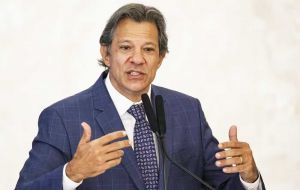MercoPress. South Atlantic News Agency
Hard times ahead for Lula and Brazilian Real, the most devalued currency in 2024
 Lula da Silva recovering from head injuries and surgery
Lula da Silva recovering from head injuries and surgery US dollar expectations in the Brazilian market are beating forecasts having reached R$ 6.30 in December, (from 4.85 in January 2024) making the Brazilian Real one of the largest currencies of emerging countries, as the most devalued during 2024, despite the Central Bank pumping some US$ 17 billion to the market hoping to contain the slide.
Finally the commercial dollar settled at R$ 6.12, but the Central Bank Focus survey gives a surprising view of what it is expecting in the near future.
The fact is that Brazil’s Real lost 21% of its value in twelve months compared to 16% for the Mexican Peso, 16% for the Turkish pound, 15% for the Russian Rouble and 10% for the South Korean Won, plus 8% for the Canadian dollar and 7% for the Australian dollar. Pound sterling towards December managed to keep its exchange rate vis-a-vis US$.
The rhetoric and what president elect Donald Trump can effectively implement, including his announced tariffs policy, have global financial markets on the brink, but in the case of Brazil, the situation can be attributed to a growing fiscal and primary deficits, despite the fact that president Lula da Silva and his Finance minister Fernando Haddad, believe it is positive since the Brazilian economy is beating growth forecasts and unemployment is the lowest in twelve years. However inflation continues to mount and so does the country’s debt and interest payments.
Lula da Silva back from head surgery blasted market expectations, “nobody in this country or in the markets has a greater fiscal responsibility than me; I handed this country’s finances in a privileged situation, and I’m planning to do the same, and it’s not the market that should be worried about government spending. Because if I don’s control expenses, and if I spend more than what I have, who are going to pay, are the poor. The only wrong this in this country is the interest rates policy that is above 12%”.
In effect this month in their last 2024 meeting the Brazilian Central Bank monetary policy committee, Copom, decided to increase the rate to 12,25%, and anticipated a further rise early 2025 to combat inflation and monetary volatility. A unanimous decision including that of Gabriel Galipolo, Lula’s pick to head the central bank in 2025, who aligned with the orthodox board of directors, (loathed by Lula), openly criticized minister Haddad handling of the budget.
In other words more trouble ahead, financial and political. The central bank inflation estimate target for for 2024 and 25, was 3%, but ended at 4.50% in 24, and heading for 4.84%. As to the basic Selic rate for 2024, ending at 12.25% is estimated to peak 14.75% during the next year and ending 2025 at 14%, while the Brazilian economy estimate growth is forecasted at 2,02% up from 2,01%.
Another disturbing issue is the so called fiscal package announced by Lula and Haddad, and approved by Congress before the summer recess, to try and curb expenses and/or raise revenue.
It plans to cut spending by 330 billion R$ some 55 US$ billion, but it is quite messy, includes a reform of the income tax system and several sectors of the Brazilian economy that enjoy special tax benefits are against any such limitations.
With a difficult and changing coalition it is difficult to see how the Lula administration will manage to implement the gradual five year plan to cut expenses. Few in Brazil question Lula da Silva’s political talent, charisma and influence, despite his head injuries and surgery, but not the same can be said of his Finance minister, so there are fears foreign investment will slow down, inflation will continue, so will national debt climbing to some 81% of GDP, with a fiscal budget in the region of 10% of GDP, even when many debt documents are held in the same country.
Haddad has argued that he received government accounts with too much “accounting make up” and “overcoming congressional resistance, despite Lula, won’t be easy, but we will keep track of spending”.
Analysts on the other hand have different interpretations, “Congress is not the problem, problem are parties funds for the next election and changing some budget legislation, plus some judiciary branch exceptional benefits and expenditures”, points out Dharma political analyst Creomar de Souza.
“As during the first government of Lula, he should have applied the fiscal measures at the start, not two years later, “things are far more complicated now, and I don’t know if he will have the big economic expansion boost in time for 2026”
For Claudia Moreno from C6 Bank, things have become so much more difficult because “the cost of a fiscal tightening now is maybe too late, following on the upsurge of the US dollar”. It makes the Central Bank task more demanding and it will have to apply higher interest rates”
Furthermore, “it will have an impact on national debt costs and the fiscal package is tighter to implement every day, with higher interest rates.”





Top Comments
Disclaimer & comment rules-

-

-

Read all commentsThe government, now in control of the Central Bank, has begun selling dollars on the market. It has already sold 30 billion dollars on the spot market. The dollars sold came from our foreign exchange reserves account held with the US Treasury.
Dec 30th, 2024 - 10:01 am 0There are still another $350 billion to be sold before we can practically pay off our domestic debt.
Just to clarify that our trade with China and Russia is done in local currency. This means that future contributions to foreign exchange reserves will be made in yuan.
https://www.cnnbrasil.com.br/economia/macroeconomia/brasil-ja-possui-124-bilhoes-de-iuans-em-reservas-internacionais/#:~:text=O%20Brasil%20encerrou%20o%20ano,do%20Banco%20Central%20(BC).
Enjoy the Yuan... ;)
Dec 31st, 2024 - 03:40 am 0Brasshole,
Jan 02nd, 2025 - 09:02 pm 0Are you nuts ? The government does NOT control the Central Bank - the bank maintains its independence ( necessary in order to control the value of the currency without political interference).
We all know that nine-fingers would love to control it, so much so that when he appointed Galípolo to succeed Roberto Campos Neto as the president of the CB as of January 1st, he had hopes that he would be able to manipulate him.....but, as luck would have it, Galipolo, since becoming a member of the Board of Directors of the CB, has shown that he is a serious financial operator, and has voted in exactly the same way as Roberto Campos Neto at the COPOM meetings (convened once a month to decide the SELIC rate).
Galipolo is not a fool, nor is he prepared to ruin his reputation just to please nine-fingers who, like you, is an ignoramus when it comes down to economics and market forces..
And, just fyi, the reserves of roughly USD 350 billion, are assets (held by CB - not by the US treasury), to act as a kind of insurance, or guarantee, that the country can face its international obligations, and against external shocks such as currency crises and/ or interruptions of the influx of foreign currency.
Also, the reserves are not used, or at least, should not be used, to pay off domesctic debt.
And our trade with China and Russia is still a good way away from being conducted in local currency..
Brasshole, have you no financial education whatsoever ? in one post you have managed to tell 3 lies, or to show how ignorant you are....a typical lefty.
Commenting for this story is now closed.
If you have a Facebook account, become a fan and comment on our Facebook Page!